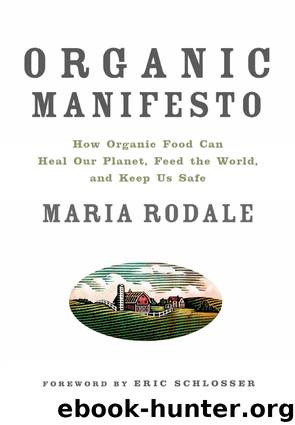Organic Manifesto by Maria Rodale

Author:Maria Rodale
Language: eng
Format: epub, pdf
Publisher: Rodale Inc
Published: 2010-03-15T00:00:00+00:00
GOVERNMENT AS USUAL
I recently had the honor of meeting Tom Vilsack, President Barack Obama's secretary of agriculture, at a forum on the People's Garden Initiative. Vilsack made the very bold move of digging up the front lawn of the USDA headquarters building in Washington, DC, to plant a certified organic vegetable garden—despite his connection to the biotech industry.
He told us that the programs he hopes to spearhead will be “sustainable.” He plans to create a sustainable department that helps children have sustainable diets, help rural economies be sustainable, and have a sustainable presence globally. He has a true desire to see people reconnect with the land and understand where their food comes from and to make kids healthier by improving the nutritional content of foods and improving school lunches. He seems to really want to help support the growing movement to “re-supply rural America” and, as he mentioned in the meeting, the 108,000 small farmers who have just started farming in the last 5 years.
Using the word “sustainable” is safe for him because it means so many different things to people. To the chemical companies, it means better seeds and profits. To “foodies,” it means local foods in season, perhaps organic. To environmentalists, it means protecting wildlife and saving energy.
But when I asked him how much flexibility he has to change the farm bill, which was approved right before he was appointed, he replied, “That's a sore subject.”
To change anything in the farm bill, Vilsack must go back to the Senate's agricultural and appropriations committees, where, he says, “there's this feeling that they went through some traumatic experiences putting this farm bill together and they don't want to revisit it.” While he does have some avenues for using some of the money creatively, he said he was shocked to find that in the past, money in the farm bill for rural development went to build motels.
Senator Bob Casey Jr. of Pennsylvania sits on the committee that wrote the farm bill. In an e-mail exchange with me about Vilsack's reference to the trauma of putting this farm bill together, Casey wrote,
I think Secretary Vilsack was referring to the very long and arduous process that the Committee undertakes every 5 to 7 years when we reauthorize the Farm Bill. It is a long road to get a bill of that magnitude written in a way that balances regional interests and lines up the votes necessary for passage. Once the Committee and the Senate have completed the process and created a delicately balanced farm bill, the general attitude seems to be that we don't want to reopen portions of that bill at the risk of jeopardizing the bigger agreements that made the bill possible in the first place. In addition, there is a very strong feeling among Committee members that the farm bill is a 5 year contract that the federal government makes with farmers. It tells them what they can expect and what they can count on so that they can make business plans and determine appropriate investments.
Download
This site does not store any files on its server. We only index and link to content provided by other sites. Please contact the content providers to delete copyright contents if any and email us, we'll remove relevant links or contents immediately.
| Container Gardening | Hydroponics |
| Organic | Propagation & Cultivation |
| Topiary | Urban |
| Water Gardens & Ponds |
Turbulence by E. J. Noyes(7032)
The Thirst by Nesbo Jo(5778)
Gerald's Game by Stephen King(3913)
Be in a Treehouse by Pete Nelson(3206)
Marijuana Grower's Handbook by Ed Rosenthal(3114)
The Sprouting Book by Ann Wigmore(3049)
The Red Files by Lee Winter(2908)
The Remains of the Day by Kazuo Ishiguro(2614)
Sharp Objects: A Novel by Gillian Flynn(2439)
Christian (The Protectors Book 1) by L. Ann Marie(2392)
Organic Mushroom Farming and Mycoremediation by Tradd Cotter(2304)
The Culinary Herbal by Susan Belsinger(2055)
Stone Building by Kevin Gardner(1992)
The Starter Garden Handbook by Alice Mary Alvrez(1922)
Lilac Girls by Martha Hall Kelly(1868)
The Unlikely Pilgrimage of Harold Fry by Rachel Joyce(1834)
The Lean Farm Guide to Growing Vegetables: More In-Depth Lean Techniques for Efficient Organic Production by Ben Hartman(1782)
Urban Farming by Thomas Fox(1748)
Backyard Woodland by Josh VanBrakle(1586)
